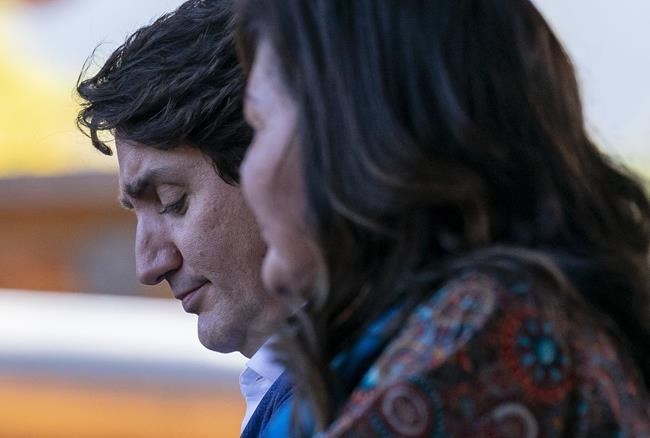KAMLOOPS, B.C. — Justin Trudeau's visit was a chance to move forward, Tk’emlúps te Secwepemc Chief Rosanne Casimir said Monday, even as she rebuked the prime minister for ignoring her first invitations to join the community for Canada's first National Day for Truth and Reconciliation.
With Trudeau sitting beside her and the former Kamloops Indian Residential School looming in the background, Casimir said his visit was "bittersweet." She said she hoped he'd been there on Sept. 30 to interact with survivors and "show his commitment to rectifying the historical wrongs of residential school and to grieve with our residential school survivors."
"Instead, in the middle of truth telling, cultural grounding and sharing that unfolded as part of the commemoration of the very first National Day for Truth and Reconciliation, in this arbour, a journalist quietly informed us that the prime minister, Justin Trudeau, was on vacation in Tofino," Casimir said.
"The shock, anger and sorrow and disbelief was palpable in our community."
Trudeau had apologized to Casimir previously by phone, but he told the few dozen people gathered Monday that he regrets his decision not to accept the original invitations.
"It was a mistake and I understand that it made a very difficult day even harder," he said. "You didn't have to invite me back, I know that. Thank you for doing so."
Casimir said she had invited Trudeau to attend the Sept. 30 day with her community, either in person or by providing video remarks, but his office didn’t respond. Trudeau attended a national event in Ottawa the evening of Sept. 29, while on Sept. 30 he said had phone conversations with several residential school survivors.
Trudeau said he knows his decision overshadowed the events of both that day and the evening before, when a flag honouring residential school survivors was flown on Parliament Hill.
"Instead of talking about truth and reconciliation, people talked about me, and that's on me," he said Monday. "I take responsibility for that."
Casimir said Trudeau's visit was "about making some positive steps forward and rectifying a mistake."
More than 1,300 unmarked burial sites on the grounds of former residential schools have been uncovered since last spring using ground-penetrating radar. The first 215 were identified at the Kamloops institution in May.
The prime minister heard Monday from a grandmother, her daughter and granddaughter about how the residential school system had affected the family through direct and intergenerational trauma.
Trudeau said he had hoped there would be faster progress on reconciliation since his government was first elected in 2015.
"We have a lot of catching up to do on the work that you have already done," he said.
"And I take that on, directly and personally. But let us not forget that what took generations and centuries to break can never be fixed overnight."
National Chief RoseAnne Archibald of the Assembly of First Nations told the group that the "little ones" whose burial sites have been found deserve justice. They also need to be named and should either be ceremonially or physically returned to their homelands, she said.
"Someone must be charged for the deaths of our children," she added.
She said the assembly wants a United Nations special rapporteur appointed to investigate impartially.
"Canada must be held accountable for its genocidal laws and policies, Archibald said. “Canada must not be allowed to investigate itself."
Terry Teegee, regional chief of the British Columbia Assembly of First Nations, said Indigenous people are "beyond theatrics, platitudes and words" and "need to see action" to help the healing.
"And this is your third election," Teegee said of Trudeau. "So, your third chance, if you will."
Earlier Monday, Trudeau visited the sacred site where the children's graves were located.
"It was a long-awaited moment to receive a personal hand of recognition and sympathy regarding this horrific confirmation of unmarked graves from the Canadian (prime minister)," Casimir said.
She reiterated calls for "unfettered access" to all of the documents that might help identify the children buried at residential schools, for resources to help finish searching the entire grounds of the former school, and for Ottawa to fund a new healing centre for survivors and their families in the Kamloops area.
Trudeau said he committed to her that Ottawa would work with them on a healing centre, an elders' lodge and to find the answers needed.
There are records going back to the late 1800s for the Kamloops institution, he said. His government is willing to work with other organizations, including the Catholic Church, to help find other records and information that may exist, Trudeau added.
There is obviously an ongoing dialogue with the Canadian Conference of Catholic Bishops and Indigenous leadership involved, as well with the Vatican, Trudeau said.
"I think that the millions of Catholics like me across this country expect the church to step up and fulfil its moral responsibilities, its legal and economic responsibilities, its historic responsibilities, but also to practise what it quite literally preaches."
— With files from Mia Rabson in Ottawa and Hina Alam in Vancouver.
This report by The Canadian Press was first published Oct. 18, 2021.
Brenna Owen, The Canadian Press




